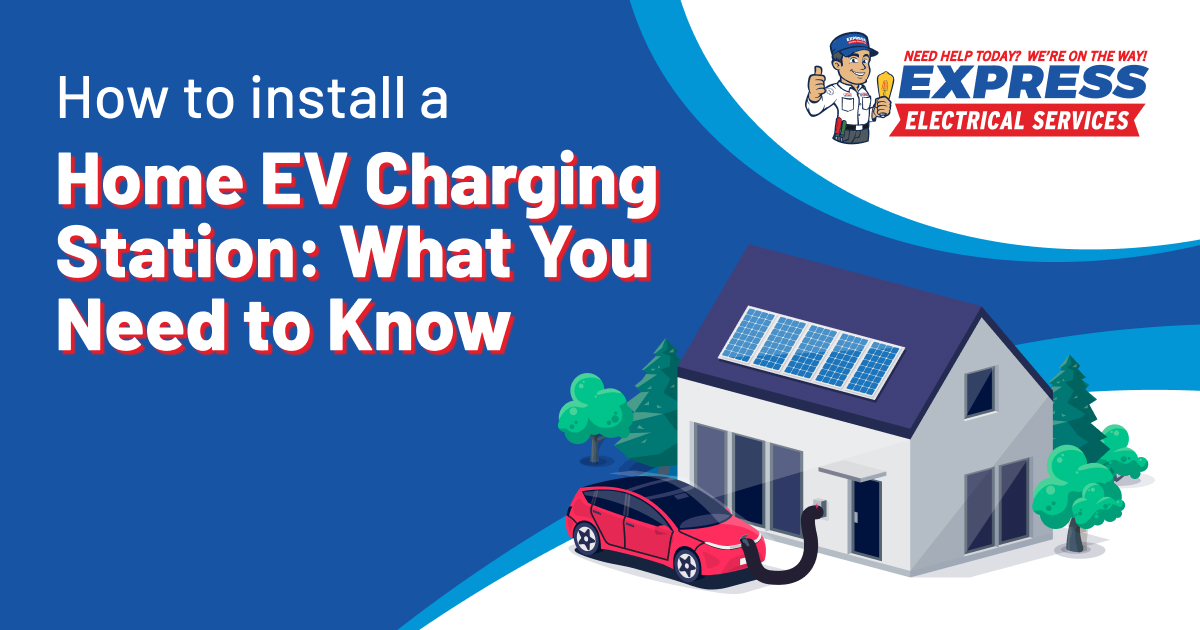How to Install a Home EV Charging Station: What You Need to Know

A lot of electric vehicles are now on the market. They protect the environment against emissions and the cost of ownership is less than conventional gas-fueled models. But realize it’s not only a car you’re investing in; you also need the means to charge it. Here, we’ll look at what you need to know about choosing and installing a home EV charger, which we at Express Electrical Services can help with.
Should I Buy a Home EV Charging Station First?
It would seem practical to install a charger before you purchase the vehicle. After all, the battery will need to be charged before you can drive the car. But for the most part, electric vehicles come with a Level 1 charger. It’s simple to use and plugs into a standard outlet (it looks like a cable with a three-prong plug). The only downside is that it’ll charge your EV battery slowly (adding about four to six miles of range per hour of charging). An empty battery can take a full day to charge.
*With any EV charger, you need to ensure your electrical system is up to date. If your electrical panel doesn’t support the amperage, you can end up with many problems.
Installing a Level 2 Charging Station
A Level 2 unit will allow for faster EV charging at home. Able to completely charge an EV battery overnight and add dozens of miles of range per hour, it requires a 240-volt circuit. You can install a portable Level 2 charging station that uses the same multi-pronged plug and outlet that a clothes dryer does. But you don’t have to resort to constantly switching out plugs in the laundry room.
A dedicated circuit can be installed and a charging station hard-wired to it in your garage. You can also plug a portable unit into that receptacle. However, a permanent Level 2 station is more convenient. Plus, it can fully recharge most EV batteries in under four hours. Choosing the right home EV charger depends on what the vehicle manufacturer specifies and what is compatible with your electrical system. There are dozens of Level 2 charging stations to choose from.
Level 3 charging stations are the fastest thanks to DC fast charging. However, they’re designed for commercial use. You’ll find them at roadside EV charging areas. A fully discharged EV battery can be fully charged in under an hour, and charging times are expected to get even shorter.
Cost of EV Charger Installation
A Level 3 charging station can cost around $50,000, according to JD Power.1 Some even cost upwards of $100,000.2 It’s therefore out of reach for most homeowners (besides, the power requirements exceed residential standards). You can use the charging cord that came with your electric vehicle if slow charging isn’t a concern. Level 1 chargers simply mount to the wall and plug into an existing outlet when you need them; they can cost up to $300 to purchase.
For a Level 2 charging station, you’ll spend at least that. Hard-wired, wall-mounted units can cost over $1,000 and you’ll need an electrician to install one. The job requires working with the electrical panel and potentially upgrading it. When you consider labor, additional electrical updates, and permits, you could spend over $2,000 to install a Level 2 charger.
Contact Express Electrical Services
Our licensed, fully trained electricians can handle the technicalities of installing a Level 2 home EV charger. We’ll even help select a brand and model best suited for your vehicle and home. Eliminating any hazards, our technicians work quickly and will be available 24/7 in case you need help with your home EV charging station. Our response time is 60 to 90 minutes. Coupons, discounts, and our fix now pay later program make our professional service affordable.
To learn more or request service anywhere in Southern California, call 323-727-7799.
